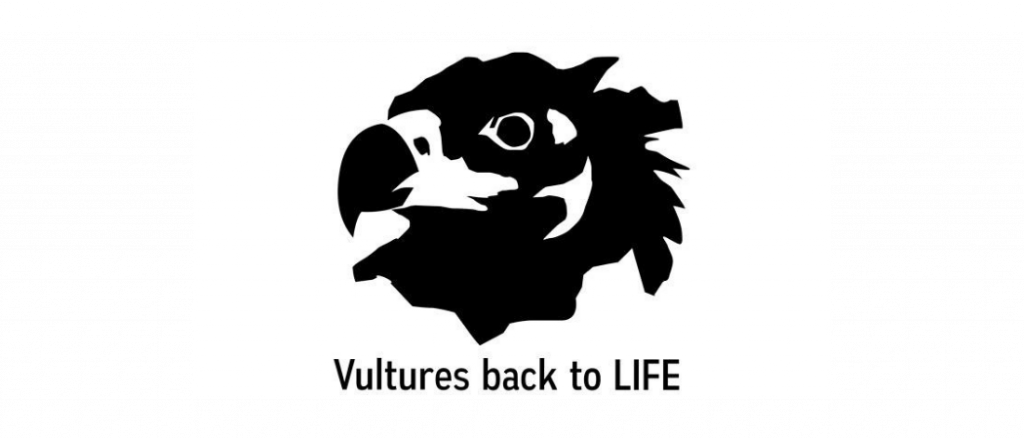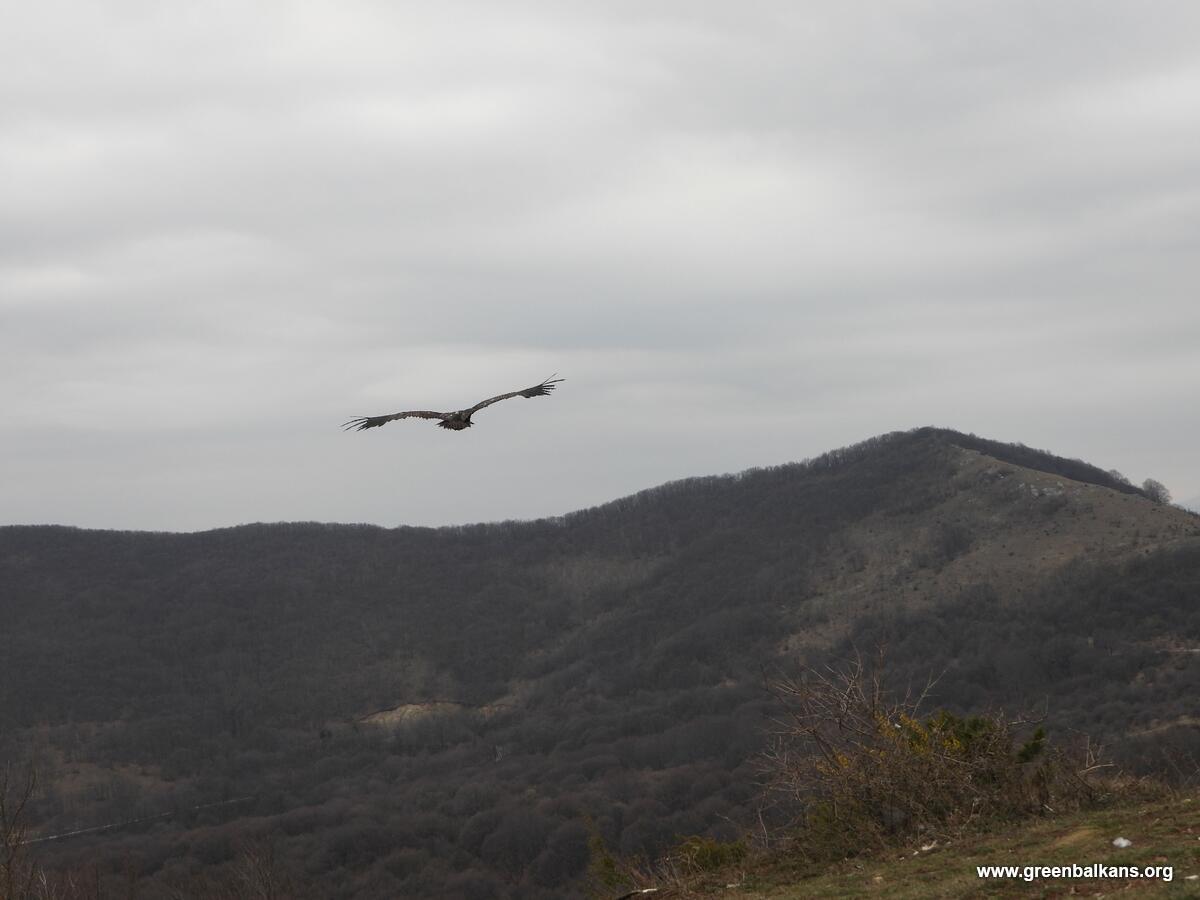
Bulgaria’s nature has been deprived of Cinereous Vulture nesting pairs for decades. Until last year, when a reintroduced pair hatched a chick in the wild for the first time in 28 years. The young vulture successfully fledged in the wild in the Eastern Balkan Mountains and received the name Minchev-Boev. This development provided high hopes and marked a significant milestone in our efforts to restore this species to Bulgaria. But, sadly, yesterday we suffered a substantial setback. One illegal animal poisoning incident wiped out four Cinereous Vultures, including Minchev-Boev. Years of conservation efforts blown away overnight. One step forward, two steps back. Or maybe three in this case. But, we will fight until we achieve some justice.
Mass poisoning wipes out protected vulture species
Yesterday, after receiving alarming data from the GPS transmitters of some Cinereous Vultures, our colleagues from Fund for Wild Flora and Fauna rushed to the scene. But it was too late, the vultures were already dead. In a remote spot at Ticha village in Kotel (Eastern Balkan Mountain), they discovered the lifeless bodies of four Cinereous Vultures, a Common Buzzard and two shepherd dogs. Most likely, the perpetrators poisoned the dogs and dumped their carcasses. As one of the most efficient scavengers, the vultures found the carcasses and quickly consumed the poisoned remains, which resulted in their tragic death. Poisoning is an illegal and non-selective method of killing animals that often causes a vicious cycle of poisoning events. If not for the GPS transmitters and intensive monitoring of vultures that helped swiftly detect and remove the poisoned animals, the casualties could have been far graver.






Today, the anti-poisoning dog unit of the Bulgarian Society of the Protection of Birds also searched the scene. Utilizing the superior sense of smell of the working dog, trained to track poisoned animals and baits, they further found two poisoned jackals.
A blow to the Cinereous Vulture reintroduction project
Vratsa, Bulgar and Bai Ivan were three reintroduced Cinereous Vultures coming from the wild in Spain and provided by the Junta de Extremadura, in coordination with AMUS and us at the Vulture Conservation Foundation. The Vultures Back to LIFE project team released these Cinereous Vultures in the wild, hoping they would settle in Bulgaria, raise a family and help create a new generation. But their lives were cut short.
The fourth one, Minchev-Boev, has brought much-needed hope for the return of the species. He hatched and fledged in 2021 on the territory of Kotlenska Planina, marking the return of the Cinereous Vulture as a breeding species in Bulgaria decades after its extinction. We were glad that he didn’t start wandering around in foreign lands last autumn since young and inexperienced birds often don’t survive during these excursions. Unfortunately, his destiny was to perish in his native land.
This lethal incident caused substantial damage to our long-term reintroduction efforts in Bulgaria. But, the Vultures Back to LIFE team will persevere and make sure these birds didn’t die in vain.
The perpetrators must be punished for the damage caused
Following the anti-poisoning protocol, the Vultures Back to LIFE team responded to the incident accordingly and quickly mobilized the relevant stakeholders to manage and investigate this serious environmental crime.
The Kotel Regional Police Department has launched a preliminary investigation. In accordance with their competencies, Sliven District Prosecutor’s Office, Regional Inspectorate for Environment and Water – Stara Zagora, Bulgarian food safety agency – Sliven and Southeast State Company – Sliven, were all contacted.
All evidence of the crime has been collected and will be investigated. The poisoned animals will be autopsied at the Wildlife Rescue Center in the Green Balkans. Laboratories in Bulgaria and Spain will examine collected tissues from the dead animals.
The project team also had a national coordination meeting with the ministry, prosecutor, lawyer, police and all NGOs involved. The involvement and engagement of these institutions are vital to bringing the offender(s) responsible to justice!
A big thank you to everyone for their quick response. We will do everything in our power to help solve the case soon.
Illegal animal poisoning remains a threat in Bulgaria
The latest incident signifies that illegal animal poisoning continues to pose an alarming threat to vultures in Bulgaria. As a consequence of this illegal practice, both the Bearded Vulture and the Cinereous Vulture became extinct in Bulgaria. Additionally, the use of poison has led to the decline of the Egyptian Vulture and Griffon Vulture populations, and their disappearance in some areas in the country. We must continue to fight this threat head-on by raising awareness, building capacities and prosecuting perpetrators to help deter such instances from happening, and help secure a brighter future for vultures and other wildlife.
The Bulgarian authorities have recently developed and adopted an anti-poisoning action plan, and we hope this case will serve as a case study for the adequate implementation of the anti-poisoning protocols, and that a proper criminal investigation is conducted, with suspects identified and brought to justice. Impunity is one of the main drivers why this environmental crime is still widely practised in Bulgaria and elsewhere, and this must stop.
Photos: Ivelin Ivanov, Green Balkans
The Vultures Back to LIFE project

Led by Green Balkans in collaboration with the Fund for Wild Flora and Fauna, Vulture Conservation Foundation, Junta de Extremadura and Euronatur, the Vultures Back to LIFE project aims to reintroduce the Cinereous or Eurasian Black Vulture to Bulgaria. The team will transfer and release into the wild around 60 birds, some coming from captive-breeding backgrounds but mostly from Spanish wildlife rehabilitation centres. The project will also create supplementary feeding stations, increase populations of wild herbivores, improve nesting conditions and tackle some of the major threats to support the return of the species.




